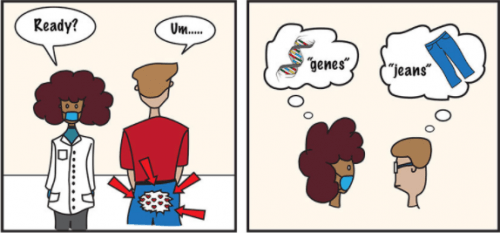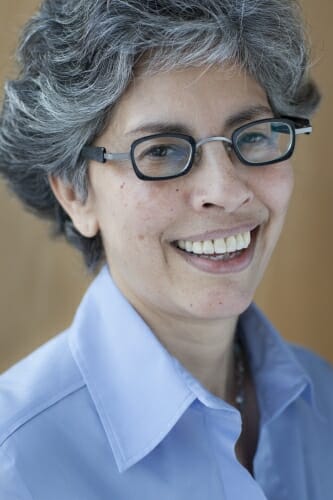Cartoons communicate issues in bioethics research
Pilar Ossorio admits that scientists sometimes view bioethics as compliance with checklists — despite how vital ethics are to responsibly conducting research.
So Ossorio and her colleagues went looking for a new way to engage people with bioethical subject matter.
“We were thinking about ways that we could get people talking and thinking about research ethics issues, but thinking about things in a nuanced manner and by bringing their creativity and personal experience in a research environment to bear on the issues,” says Ossorio.

Detail from “Lost in Transcription,” one of the entries in the Bioethics Cartooning Contest. © 2017 Khoa Tran
Their solution was the first-ever Morgridge Ethics Cartooning Contest, which invited graduate students and postdoctoral researchers working in the biomedical sciences to turn their ethical questions into comic strips. Out of 41 entries, 23 comics were submitted and 15 finalists are on display for the public to vote on and select the winner.
Voting continues through Jan. 31. The top three artists will receive bragging rights and cash prizes funded by the Morgridge Institute for Research.
The comics span topics from informed consent and recruitment into clinical trials to statistical manipulation of data and problems with reproducibility in science. Many are ultimately about how truthfully research is communicated — to patients, to the public, even to other scientists.
“We had a really broad spectrum of topics and I was pretty happy about that. Among other things, it means we drew people from lots of different areas of the biomedical sciences,” says Ossorio, a professor of law and bioethics at the University of Wisconsin Law School and the bioethicist in residence at the Morgridge Institute.
Though this year’s contest was limited to postdocs and grad students, Ossorio is already looking ahead to next year, when she plans to open it up to a broader group of individuals working in the biomedical fields.
And although some of the cartoons reach into science fiction, like adding appendages with genetic engineering, Ossorio sees them as continuing a long tradition of hyperbole and political commentary in cartoons in order to help discuss difficult topics.
Ultimately, the contest is designed to make ethics more approachable, especially for the people charged with incorporating ethics into their daily research.
“We wanted to get people thinking of research ethics as something to deliberate about rather than something that’s just a form to fill out,” Ossorio says.

